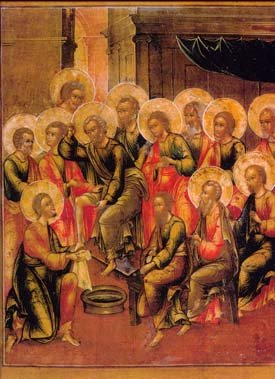Text:
Mark 6:13-29.
Mark’s narrative gets strange here. He tells us the big thing God’s anointed is doing next, but then he remembers there’s a background story to share with us, and a pretty
disturbing one at that.
John the Baptizer died for a very stupid reason. Herod had been afraid of him, and rightfully so. John had come on the scene preaching repentance with quite a following, while Herod was a minor ruler serving an oppressive power but had lofty pretensions to being called the King of the Jews. He feared John as a man of God, so he knew that silencing this popular prophet would bring God’s wrath, as well as kill the last of his credibility with his people. Even when John attacked his “
family values,” that fox kept a respectful distance.
But then Herod had a birthday party, and probably quite drunk and not a little lusty, asked his niece to dance for his assembled guests. She must have been quite a diva, because afterwards he blustered a promise to reward her with whatever she wished, up to the half of his kingdom. Still feeling the humiliation of the Baptizer’s rebuke, her mother Herodias knew just the thing: John’s head. So Herod’s moral weakness and pride picked up where his resolve had failed. He had John executed.
John was the greatest and last prophet of Israel, Jesus said. He announced the arrival of Israel’s Messiah, and began the work of ushering them into the Reign of Yahweh, warning that “the powers that be” were coming to an end and that people who responded to Yahweh and those who kept serving the powers would be separated like wheat and chaff, and once the chaff started burning,
wasn’t nothing gonna put the fire. The forces of greed, lust, domination and oppression, were about to be dethroned.
And yet.We see Herod and his family and friends, people controlled by the “principalities and powers,” wallowing in their own excess and dispatching John on a drunken whim.
There is no Hollywood ending to wrap it all up very neatly. Perhaps John recovers while in hiding, and makes Herod pay, or Jesus and the crew show up and break down his palace to rubble. But that doesn’t happen.
His disciples took the body and laid it in a tomb. How melancholy.
What is God’s response to this? Let’s recall what reminded Mark to tell the story.
“They drove out many demons and anointed many sick people with oil and healed them.”
Jesus disarms the powers not by fighting puppets like Herod, but by undermining them. The principalities and powers, and those that serve them, can control with lies. They
cannot make free by the truth. They can hurt.
They cannot heal. They can inspire hatred or lust, but
love is beyond them. Jesus and his disciples, however, could do these things.
So how will we live under the rule of Yahweh when we’re surrounded by fear and the domination of “the powers that be”? We will listen for and speak to one another the prophetic words that there is
nothing in life, death, heaven, hell, sickness, poverty, or any fear that can separate us from the love of God that has been demonstrated to us in Jesus Christ. Nothing at all. We will approach the altar of God as free people and receive Jesus again into ourselves, and trust in his love and dedication to us, the promise that our life is in Christ.
Then we will go. We will carry the peace of God with us and give it away to others by our words and the tender works of our hands. The Kingdom is coming, and
nothing will stop it. It is here among us now. Amen.









